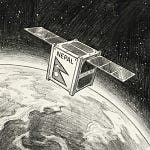Share the love! Help others that care about Nepal stay up to date the easy way. If you like this issue, share it with a friend who follows Nepal and hit Subscribe for your weekly dose of curated, can’t-miss updates.

While farmers are reeling from a devastating Rs 3.55 billion loss due to low rainfall—risking a projected 5% drop in paddy—Nepal’s political landscape is making moves. PM Karki is championing the long-awaited right to diaspora voting, a historic step for Nepalis abroad. This week, Nepal grapples with a complex week as political turbulence in Madhesh, economic strains from protest fallout, and significant agricultural losses overshadow the journey towards stability. Yet, amidst these challenges, glimpses of progress emerge, from strategic infrastructure developments to vital discussions on diaspora voting rights and innovative social programs. This week’s digest navigates the currents shaping Nepal’s future, offering a concise look at the nation’s ongoing efforts to rebuild, reform, and reconnect with its global community.
Diaspora & Globalisation 🌍
In a significant move for Nepalis abroad, Prime Minister Sushila Karki is championing efforts to enable out-of-constituency and overseas voting [8]. This initiative aims to address a long-standing demand from the diaspora, potentially allowing citizens living far from home to participate more easily in national elections and lessening the financial burden on political parties during campaigns. Adding to positive international travel news, Hong Kong has lifted its mandatory transit visa requirement for Nepali passport holders passing through Hong Kong International Airport to other countries, a decision resulting from continuous diplomatic efforts [1]. This change, effective November 15, is expected to make international travel more convenient for many Nepalis. Meanwhile, the Minister for Communications and Information Technology, Jagdish Kharel, has urged officials at the Nepali Embassy in South Korea to act as guardians for Nepalis residing there, promoting their rights and welfare and strengthening bilateral ties [9]. Nepal has also signed a deal with India to enhance rail trade connectivity, boosting multimodal trade with its southern neighbor. However, a caution has been issued by the Nepali Embassy in Portugal, warning Nepalis against fraudulent schemes amid visa suspension.
The Nepali Embassy in Portugal has specifically alerted its citizens to potential scams following the country’s suspension of most work visas since October 23, 2025. This highlights the ongoing vulnerability of migrant workers to exploitation and underscores the importance of official channels. During a recent visit, Communications Minister Kharel further emphasized the need for the Nepali Embassy in Seoul to facilitate foreign investment in Nepal, along with addressing the mental health challenges faced by Nepali migrant workers in Korea [9]. He also committed to increasing human resources at the embassy to better serve the Nepali community.
Further strengthening international links, Nepal is pushing for direct flights to Seoul via Nepal Airlines, which would significantly benefit the estimated 100,000 Nepalis living in South Korea. The government is also exploring options to ensure voting rights for Nepalis abroad, aligning with the spirit of the Gen Z movement which calls for greater accountability and participation. These efforts aim to bridge the geographical gap for the diaspora and integrate them more fully into Nepal’s political and economic landscape. Meanwhile, the International Relations Concern Community (IRCC) Nepal has been launched to promote diplomatic excellence by advocating for a merit-based appointment system for diplomats, ensuring qualified experts represent the nation on the global stage.
Politics & Governance 🏛️
Madhesh Province is currently in the grip of political turmoil following the controversial appointment of Chief Minister Saroj Kumar Yadav. The provincial governor, Sumitra Subedi Bhandari, appointed Yadav under Article 168 (3) of the Constitution, a move that immediately drew widespread condemnation and protests from rival parties, including the Nepali Congress. Reports indicate that the appointment and oath-taking ceremony took place discreetly in a hotel, rather than the official provincial headquarters, leading to allegations of constitutional impropriety. As a direct consequence, the Supreme Court has issued an interim order restricting Chief Minister Yadav from making any long-term policy decisions for the province. The controversy further escalated, leading to the federal government’s recommendation to the President to relieve Governor Bhandari of her duties, a recommendation that was subsequently acted upon, with Surendra Labh Karna appointed as the new Madhesh Province Chief [11]. A writ petition challenging Yadav’s appointment, filed by 74 Madhesh lawmakers, has been registered in the Supreme Court, with a hearing scheduled to determine its legality [8].
The political maneuvering in Madhesh has also led to calls for unity and accountability. CPN (UML) Deputy General Secretary Pradip Gyawali stressed the importance of political stability for national development, while alleging infiltration and premeditated attacks during the recent Gen Z movement [15]. Simultaneously, Prime Minister Sushila Karki has assured that the private sector, which suffered losses during the Gen Z movement, will receive relief, similar to the assistance provided to injured protesters. She also emphasized that the government is determined to conduct elections on March 5, 2026, to ensure a political outlet for the country and maintain good governance. The Election Commission is actively preparing for these upcoming elections, consulting with former officials and making arrangements for voter registration.
In other significant governance developments, the National Building Code has officially come into effect, providing essential guidelines for construction, including underground structures for hydropower projects [4]. The Home Ministry is also working to address the spread of misinformation across digital platforms through coordinated dialogues with key agencies [2]. Furthermore, the government has classified those injured during the Gen Z protests into four categories to facilitate relief efforts. Amidst these political and administrative shifts, the Kathmandu Metropolitan City is collaborating with Nepal Telecom to enhance its e-governance system by installing high-speed internet in 71 service centers and bolstering its CCTV network for increased safety and systematic urban management.
Economy & Development 💸
Nepal’s agricultural sector has suffered a significant blow, with heavy October rainfall causing an estimated Rs 3.55 billion loss nationwide. The Ministry of Agriculture and Livestock Development projects a five percent decline in paddy production this year, amounting to a shortfall of around 300,000 metric tonnes from last year’s output. This unseasonal rain, particularly in Koshi Province, damaged paddy and vegetable crops across vast areas, leading to losses exceeding Rs 2.5 billion in that province alone. The economic strain on the country is further compounded by a sharp decline in business confidence following the Gen Z protests, with nearly Rs 1.1 trillion remaining idle in the banking system due to sluggish lending and weakened investor morale [10]. The World Bank corroborates this challenging outlook, projecting Nepal’s economic growth to slow to 3.1 percent this fiscal year, a significant reduction from previous estimates of 5.2 percent, citing the damages from protests and political instability.
In response to these economic pressures, the government is taking measures to stabilize the financial system and encourage investment. The Deposit and Credit Guarantee Fund is set to invest Rs 4.66 billion into eligible commercial banks to inject liquidity and support financial stability [9]. Meanwhile, the Nepal Rastra Bank (NRB) itself will invest Rs 3.7 billion from its grant and pension fund in various banks and financial institutions for one year, setting strict eligibility criteria related to operational history, capital adequacy, and non-performing loan ratios [1]. However, the banking sector continues to face challenges, with non-performing loans (NPLs) of commercial banks reaching as high as 7.39 percent for some institutions, and an average of 4.86 percent, reflecting growing stress and weak loan recovery. This has led to an additional Rs 11 billion being allocated for provisioning in the first three months of the fiscal year, impacting bank profitability. Adding to the economic concerns, delay in clearance by Nyalam Customs has left over 600 containers stranded on the Chinese side, holding up billions of rupees worth of goods, while the NEPSE index has shown volatility, dropping by 20 points at one instance this week [12].
Despite the challenges, there are ongoing efforts to boost economic activity and address long-standing issues. The Melamchi Water Supply Project has reached an agreement to address its ongoing issues, responding to demands from local stakeholders and aiming to resolve delays in capital fund releases [12]. In the agricultural sector, freed Kamaiyas in Kanchanpur are boosting vegetable production using mulching technology, significantly increasing their income [11]. Furthermore, a new online system for distributing government-subsidized chemical fertilizers to farmers is being introduced to ensure fair access and prevent shortages. The government is also encouraging private sector involvement and public-private partnerships to rebuild business confidence, with the Finance Minister emphasizing government support and the Nepal Rastra Bank Governor urging businesses to leverage ample liquidity and lower interest rates as an opportunity [10]. Savings bonds worth Rs 3 billion have also been opened for sale, offering attractive interest rates to Nepali citizens and those in foreign employment [16]. In a positive light for connectivity, Nepal Airlines Corporation (NAC) has resumed four weekly flights to Resunga Airport, indicating improved regional air services.
Social & Cultural ⭐
Nepal is celebrating its Female Community Health Volunteers (FCHVs), who were recently recognized by the World Health Organization (WHO) with the South-East Asia Region’s Award for Public Health Champion. These volunteers are lauded for their transformative role in improving maternal and child health, increasing immunization coverage, promoting nutrition, and managing disease outbreaks, even in remote areas. However, questions about the sustainability of this volunteer-based system remain, prompting discussions on redefining roles, enhancing skills, establishing permanent support, and formalizing their role in crisis response. On the technological front, Nepal is exploring innovative solutions for clean energy and waste management with Microbial Fuel Cells (MFCs). This technology, which uses bacteria to convert organic waste into electricity, offers a sustainable alternative to hydro-dependent energy and an effective way to manage waste in Nepal. Meanwhile, Nepali students are gaining unprecedented access to international education, with MPower Financing offering collateral-free education loans of up to USD 100,000 for postgraduate studies abroad, easing financial barriers for those aspiring to study in countries like the US [2].
In the realm of education and science, 31 Nepali scientists have been recognized among the world’s best by Stanford University, highlighting Nepal’s growing scientific contributions [31]. Digital health profiles are also being developed for over 22,000 students in Kathmandu Valley, aiming to create systematic health records and provide real-time data for better decision-making. However, Nepal’s education system faces criticism for prioritizing grades over curiosity, potentially hindering undergraduate research and innovation. Furthermore, a critical discussion has emerged regarding the Musahar community in Janakpurdham, where menstruation is still viewed as a marker for marriage, leading to child marriages and significant health issues due to lack of awareness and proper hygiene.
Culturally, the 141st birth anniversary of Mahaguru Phalgunanda Lingden, a revered reformer of the Kirat religion, was celebrated across the country, honoring his contributions to language, script, traditions, and social reform. In sports, the second edition of the Nepal Premier League (NPL) is set to kick off, with Ncell continuing as a partner and matches being broadcast on Indian Star TV, indicating a growing commercialization of Nepali cricket. The beautiful Rara Lake continues to attract tourists, particularly domestic visitors, and the Annapurna Conservation Area has seen a record 246,000 foreign tourists this year, surpassing last year’s total in the first ten months. Finally, Kathmandu is hosting the sixth edition of Photo Kathmandu, an international photography festival showcasing diverse exhibits and workshops across the valley.
Let’s connect
Enjoying this issue? 📩 Share it with a friend & let’s keep Nepalis worldwide in the loop! Got thoughts? Hit reply—we’re all ears! Or let us know what you think via our Feedback form or follow us on Facebook | LinkedIn
P.S. Got a story or issue you’d like us to cover next week? Drop us a reply — we’re building this space together.
About Nepali Diaspora Digest:
The Nepali Diaspora Digest connects the global Nepali community with curated news, insights, and stories that matter most. Join us as we celebrate and explore the diverse voices and achievements of Nepalis worldwide.
Partner shout out
belayat.uk: helping Nepalis connect in the UK on jobs, housing, events and finding local Nepali owned businesses
Sources
MyRepublica - NRB to invest Rs 3.7 billion from grant fund in BFIs
MyRepublica - Nepali students can now access up to USD 100,000 in collateral-free education loans
MyRepublica - Int’l flights skipping Gautam Buddha Airport dishearten business community
MyRepublica - Rebuilding Business Confidence to Revive Economy
MyRepublica - Leapmotor Nepal wins ‘Outstanding Distributor – India & Asia Pacific’ Award
MyRepublica - Paddy yield expected to decrease by five percent this year
MyRepublica - 74 lawmakers file writ against Madhesh CM appointment, hearing set for Wednesday
MyRepublica - Economy under strain as business confidence plummets
Rising Nepal Daily - President administers oath of office to Madhes Province Chief Karna
MyRepublica - NRB dissatisfied with financial reports of commercial banks, rejects reports
NepalNews - Gabhar Valley home stay – where nature and culture meet
The Himalayan Times - Nepali Embassy warns against fraud amid Portugal visa suspension
Rising Nepal Daily - Political stability required for development: Gyawali
Rising Nepal Daily - Savings bonds worth Rs 3 billion open for sale












